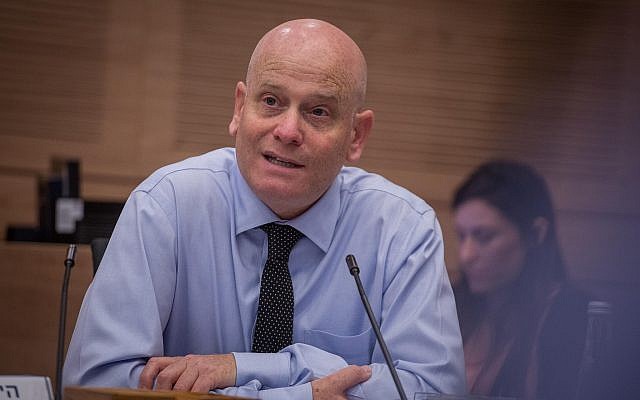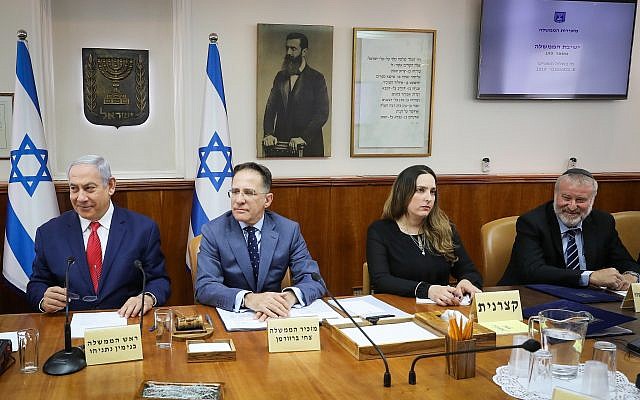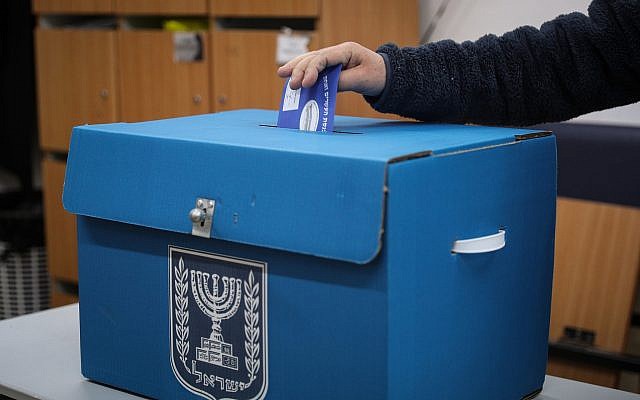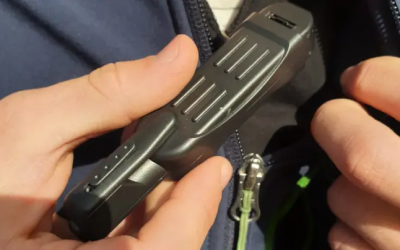Eyal Yinon argues that PM-backed legislation would give Likud party an unfair advantage as it already has over 1,000 cameras that it used to surveil Arab voters in last election

The Knesset’s legal adviser on Sunday joined Attorney General Avichai Mandelblit in opposing legislation that would allow party officials to monitor polling stations with cameras during, calling the bill pushed by Likud “unconstitutional.”
Eyal Yinon argued in his legal opinion presented to lawmakers that the Camera Bill would provide an unfair advantage to the Likud party, which already has in its possession over 1,000 body cameras that it used to surveil polling stations in Arab towns during the April election in an effort to prevent alleged voter fraud.
The Knesset legal adviser said the legislation presented a “legitimate fear of deterring voters” and “does not… answer the tests of constitutionality and disproportionately violates fundamental principles in the electoral process as well as protected constitutional rights.”
Moreover, he argued that concerns regarding a violation of election purity are being answered by the Central Election Committee’s pilot program which will see the deployment of some 3,000 non-party affiliated poll watchers to monitor for voter fraud across the county.

Yinon said that the rushed attempt to pass the law without the broad agreement of all parties in the Knesset was “unprecedented and in itself presents significant legal difficulties.”
The Knesset is likely to advance the legislation later this week, but the bill still faces significant legal hurdles.
On Sunday, the heads of the right-wing Yamina and Yisrael Beytenu parties announced they would support the proposal, while acknowledging that the legislation is a campaign ploy of Netanyahu’s Likud. Spokesmen for the ultra-Orthodox Shas and United Torah Judaism parties, and Moshe Kahlon’s Kulanu, told The Times of Israel that their respective slates would also vote in favor of the bill, giving it a likely 65 of the 120 Knesset votes.
A spokesman for Kahlon, whose Kulanu party merged with the Likud shortly after the April election, said his party’s four lawmakers would vote in favor of the bill. But Channel 13 reported that retiring Kulanu MK Roy Folkman plans to boycott the vote.
The support comes despite opposition from Mandelblit, who argued in a legal opinion last week that such consequential legislation should not be rushed through the Knesset chamber in a matter of days in order to ensure that the government has the means to enforce it. Mandelblit, the government’s top legal representative, argued that the Likud bill was “aberrant and flawed,” and could play havoc with the voting process and undermine the entire election.

The bill was approved unanimously by the cabinet on Sunday afternoon and Likud intends to advance it in a hyper-accelerated procedure between Monday and Wednesday.
According to the plan, a special committee chaired by Likud MK and Netanyahu ally Miki Zohar will be formed Monday and the bill will be brought for the first of three votes in the Knesset plenum needed for it to officially become law. On Tuesday, a full-day debate in the Knesset will be held on the proposal, and on Wednesday, it will be brought for second- and third- reading votes in the Knesset plenum.
In order to pass the bill, Zohar is expected to grant the Knesset an exemption from a standard requirement that 45 days pass from the submission of a bill before it is signed into law.
The Blue and White, Labor, Democratic Camp, and Joint List parties have all announced that they would petition the High Court of Justice against the bill if it is passed into law. Justice Ministry officials told Channel 12 that Mandleblit has not made up his mind whether he would agree to defend the legislation on the government’s behalf if it indeed came up before the top court.
Shortly after the cabinet vote, the Central Elections Committee issued a statement offering further details on the pilot program of election monitors that chairman Hanan Melcer instructed to be formed in his ruling last month that banned party officials from using cameras in polling stations.
The election body said that some 3,000 non-party affiliated individuals, among them lawyers and accountants, will tour polling stations at random during the September 17 vote. In addition, they will also pay visits to locations flagged during the April elections as having demonstrated irregular voting patterns. This team of poll watchers will be equipped with police-grade body cameras that they will be able to use in cases of fraud after having received approval from the Central Election Committee. They will also be required to film the entire ballot-counting process after the last voter has left the ballot station.
Likud in a statement issued in response to the Central Elections Committee announcement argued that the pilot program is insufficient and that they intend to push forward with the legislation.

Netanyahu claimed earlier Sunday, without citing proof, that had Likud been able to prevent voter fraud in Arab towns, the Ra’am Balad party would not have crossed the electoral threshold and the premier would have been able to form a coalition of 61 seats, instead of forcing the year’s second election.
However, Central Election Committee director Orly Adas pointed out in Hebrew media interviews Sunday that of the 140 voter fraud allegations brought forth by the Likud, none contained sufficient evidence to move forward with an indictment. Moreover, the suspicions of voter fraud where charges are slated to be filed benefited Likud and Shas, and not the Arab parties.
Adas told Channel 12 that allowing hundreds of biased party officials to film whenever they deem necessary would almost certainly lead to brawls in polling stations. She also said that the Central Elections Committee is not prepared to effectively implement such legislation given the rushed manner in which it is being advanced.
As reported by The Times of Israel
